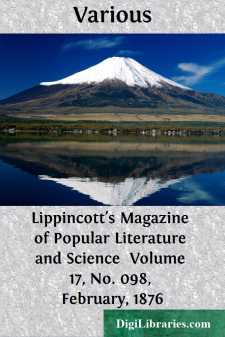Categories
- Antiques & Collectibles 13
- Architecture 36
- Art 48
- Bibles 22
- Biography & Autobiography 813
- Body, Mind & Spirit 142
- Business & Economics 28
- Children's Books 17
- Children's Fiction 14
- Computers 4
- Cooking 94
- Crafts & Hobbies 4
- Drama 346
- Education 46
- Family & Relationships 57
- Fiction 11829
- Games 19
- Gardening 17
- Health & Fitness 34
- History 1377
- House & Home 1
- Humor 147
- Juvenile Fiction 1873
- Juvenile Nonfiction 202
- Language Arts & Disciplines 88
- Law 16
- Literary Collections 686
- Literary Criticism 179
- Mathematics 13
- Medical 41
- Music 40
- Nature 179
- Non-Classifiable 1768
- Performing Arts 7
- Periodicals 1453
- Philosophy 64
- Photography 2
- Poetry 896
- Political Science 203
- Psychology 42
- Reference 154
- Religion 513
- Science 126
- Self-Help 84
- Social Science 81
- Sports & Recreation 34
- Study Aids 3
- Technology & Engineering 59
- Transportation 23
- Travel 463
- True Crime 29
Lippincott's Magazine of Popular Literature and Science Volume 17, No. 098, February, 1876
by: Various
Description:
Excerpt
THE CENTURY—ITS FRUITS AND ITS FESTIVAL.
II.—AMERICAN PROGRESS.
POST-OFFICE DEPARTMENT BUILDING AT WASHINGTON.From showing the world's right to the epoch of '76, and sketching the progress of the century in its wider aspect, a natural transition is to the part played in illustrating the period by the people from whose political birth it dates, and who have made the task of honoring it their own. They have reached their first resting-place, and pardonably enjoy the opportunity of looking back at the road they have traversed. They pause to contemplate its gloomy beginning, the perilous precipices along which it wound, and the sudden quagmires that often interrupted it, all now softened by distance and by the consciousness of success. Opening with a forest-path, it has broadened and brightened into a highway of nations.
So numerous and various were the influences, formative and impellent, which combined to bring the colonies up to the precise ripening-point of their independence, as to make it difficult to assign each its proper force. In the concentric mass, however, they stand out sharp and clear, and the conjoint effect seems preordained. That the event should have come when it did, and not before or after, is as obvious as any of history's predictions after the fact. Looking through the glasses of to-day, we find it hard to realize that the Continental Congress renewed its expressions of loyalty to the king three weeks after the battle of Bunker Hill, so distinct before us rises the completed and symmetrical edifice of separation ready for its capstone, from its foundations growing steadily through the past.
Thirteen years—one for each State—were occupied in the topping-off. The Seven Years' War, that created the new central power of modern Europe, had a great deal to do with creating the new American power. It taught the colonies their strength, gave them several thousand native soldiers, and sent them from over the water the material, some of it completely wrought, for more in the German immigration consequent upon it. Out of it grew the obnoxious enactments that brought on the end. So closely simultaneous were these with the king's proclamation of October 7, 1763, prohibiting all his subjects "from making any purchases or settlements whatever, or taking possession of any of the lands, beyond the sources of any of the rivers which fall into the Atlantic Ocean from the west or north-west," as to support the suspicion that the British ministry had a premonitory sense of the coming struggle, and meant to prepare for it by checking the expansion of the colonies. The pressure applied to front and rear was part of one and the same movement; and is incompatible with the accepted view that neither cabinet nor Parliament anticipated, in the first instance, any American opposition to the Stamp Act and the system of legislation to which it was the opening wedge. The England of that day proposed to rule America after much the same fashion with Ireland, the Alleghanies presenting themselves very conveniently for an Indian Pale....












